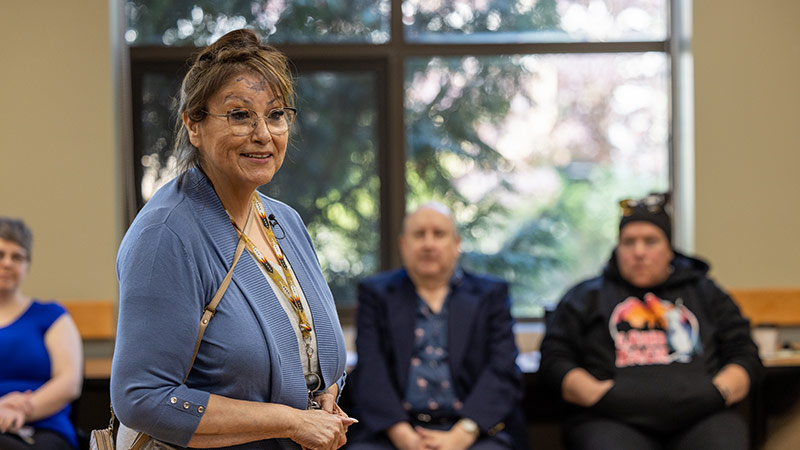Fostering the growth and success of Indigenous people with disabilities
Author: Angie Deveau
Posted on Jun 8, 2023
Category: UNB Saint John

“Each person is a sacred pipe, no matter our nationality or background and we are always in ceremony. We need to start looking after ourselves, clearing out our eyes so we can see the strength in our life.”
These were the words of Elder Andrea Simon in her opening statements as she led a five-hour circle discussion on June 1, 2023, on the University of New Brunswick (UNB) Saint John campus.
The discussion, which coincided with the beginning of Indigenous History Month, was well-attended by Indigenous students, Indigenous community members and local service providers. The university hosted it in partnership with the Saint John Indigenous Health Advisory Circle and the Wabanaki Council on Disabilities.
The university organized the event in recognition of Disability Awareness Week. The event, which was also part of the UNB Diversity Dialogues initiative, was a safe and supportive space for participants to engage in an open dialogue while fostering empathy, connection and a sense of unity.
Some participants shared personal experiences with disability and some participants gained insights into the barriers faced by Indigenous individuals.
Before the conversation began, Elder Simon asked one of the participants to lead the group in a smudging ceremony. She highlighted the practice of smudging and how the connection with the sacred pipe is a powerful means to ground oneself.
Elder Simon explained the importance of reclaiming Indigenous traditions. She said that by embracing these practices, Indigenous people can reclaim their heritage. These practices also represent an act of resistance to the erasure of Indigenous wisdom, allowing us to reconnect with our true selves.
She said engaging in smudging and connecting with our sacredness can lead to personal transformations, fostering self-love, appreciation and gratitude for the world around us.
“By acknowledging our sacredness, we can extend love and respect to others and the natural world, strengthening our interconnectedness and promoting inclusivity,” she said.
Following morning introductions and lunch, the group came together to brainstorm ideas. They created a vision board with the goal that they can no longer accept the things they cannot change.
Some of their ideas included:
- Building a friendship centre on the Saint John campus;
- Creating signage in Wolastoqey language;
- Ensuring that all buildings are accessible;
- Recognizing that various people are keepers of knowledge;
- Opening to the possibility of change;
- Providing a sacred bundle for all graduates;
- Making space to listen and learn about other people’s experiences;
- Thinking creatively and not being afraid to ask questions; and
- Developing more opportunities for representation.
Overall, many members of the group agreed that it is important to shift perspective, use an empowerment lens and use proactive approaches. Many agreed that in a perfect world, we would have no cultural or institutional barriers. Without those barriers, we would not need accommodations because a world without accommodations means that our population has developed love and kindness.
They also agreed that service providers need to situate themselves, recognize their privilege and realize that understanding someone’s culture is an empowering experience. This creates opportunities for learning and healing.
Sara Rothman, senior director of student affairs at UNB, attended the circle discussion. She said the most impactful part of the experience for her was hearing about the intersectionality of disability with other identities that people carry.
“Elder Andrea Simon generously shared her experiences as an Indigenous person with a disability while others shared their stories, informed by their identities and histories,” said Rothman.
“Her storytelling was powerful. Really powerful. It helped me to better understand the complexities of disability and colonialism and it reminded me of the importance of actively engaging with diverse perspectives so that we can be better positioned to support student success in ways that consider the whole student.”
Todd Ross, the Indigenous advisor on UNB’s Saint John campus, reflected on the university's commitment to addressing the needs of Indigenous students and working with the broader community.
“Considering truth, reconciliation, equity, diversity and inclusion, UNB recognizes we alone cannot have the answers, and working with communities and our partners through collaboration and discussion are key for us to move forward together,” said Ross.
“Coming together in a circle with traditional teachings to have these discussions serve as a catalyst for change. They highlight the importance of diversity and inclusivity. Together, we can work toward creating a compassionate and harmonious world for future generations.”
Learn more about UNB Diversity Dialogues.
